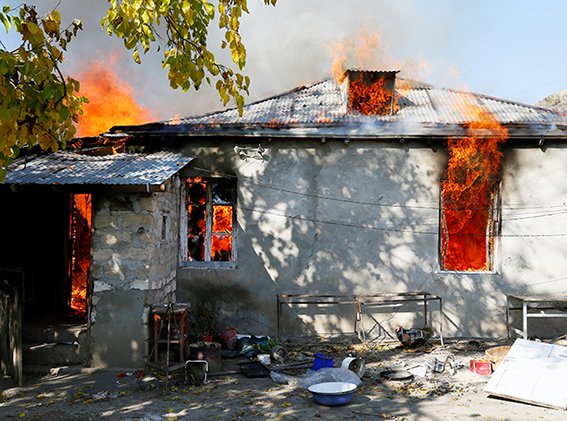Russian President Vladimir Putin on Monday brought together the leaders of Armenia and Azerbaijan for the first time since a war last year over the Nagorno-Karabakh region, an effort to resolve problems that risk undermining the deal that ended the conflict.
A Russian-brokered ceasefire agreement in November halted the six-week conflict between Azeri and ethnic Armenian forces over the mountainous enclave and surrounding areas, locking in territorial gains for Azerbaijan.
But tensions persist, with sporadic fighting, prisoners of war continuing to be held by both sides, and disagreements over how a prospective new transport corridor cutting through the region will work.
The enclave is internationally recognised as part of Azerbaijan, but both ethnic Armenians and Azeris regard it as part of their historic homelands and fought a much bigger war in the 1990s over it that left tens of thousands dead.
In opening remarks in the Kremlin, Putin said the November ceasefire deal, which saw Moscow deploy peacekeepers to the region, was being implemented.
Armenian Prime Minister Nikol Pashinyan and Azeri President Ilham Aliyev did not shake hands, only exchanging curt greetings as they sat down at an oval table opposite Putin.
The ceasefire deal sparked protests in Yerevan against Pashinyan whom protesters accused of bungling the war. He has since faced pressure from opponents to step down, something he has resisted.
Aliyev has cast the war victory at home as an historic righting of wrongs, something Armenia rejects, and held a victory parade last month with Turkish President Tayyip Erdogan.
For Russia, the conflict highlighted the rising influence of Azeri ally Turkey in the South Caucasus, part of the former Soviet Union that Moscow has traditionally seen as its own sphere of influence.
But by brokering the deal and getting Russian peacekeepers on the ground, Putin has thwarted a stronger Turkish presence for now while expanding Moscow’s own military footprint.
Dmitry Trenin, a political analyst for the Moscow Carnegie Center, said the Kremlin hoped that Monday’s talks would allow it to reaffirm its influence in the region.
“(The) peacekeeping function is Moscow’s advantage in its competitive relationship with Ankara,” Trenin wrote on Twitter.







Click here to change your cookie preferences